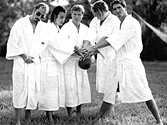

The Warholian mantra promising the elusive "15 minutes" of fame (celebrity, notoriety, does it really matter anymore?) has become a tired cliché, though it still rings true. How else can one make sense of "celebrities" such as John Wayne Bobbitt and the like, who grab the spotlight for no valid reason?
There seem to be at least three general categories of celebrated personalities. Circumstance can create celebrity, as in the case of the late Princess Diana: her claim to fame was only an accident of birth. Then there is the genuinely talented person whose career field naturally gives way to celebrity-entertainers and media personalities like Oprah or Roseanne. And finally there are the shamelessly promoted, pre-packaged celebrities, like everyone's favorite bubble gum pop quintet, the Backstreet Boys.

Where did they come from, exactly? Orlando, yes, but don't they look like they just rolled off the assembly line somewhere? And it's not just that this is a culture which values more individual styles-Tori's red locks can come courtesy of Clairol, and even Bjork's outlandish dresses can be had at your local Dolce and Gabanna boutique. It's just that so much in the mainstream today is disturbingly plastic. Like the new and improved Courtney Love. Like the Backstreet Boys.
But their fan base, which seems to be primarily pre-adolescent girls and gay men with unresolved high school fantasies, have made these five young men the "it" boys of the moment. So what does their fame signify? Do the current trends in pop culture reflect a more profound and worrying dumbing down of America?
Of course not. Don't be so dramatic. The tendency to sneer at acts like the Backstreet Boys is born of cultural elitism and an overly "grown-up" mentality. For people in their twenties, pop songs from the eighties are near sacrosanct, as they are inextricably tied with memories of childhood. But just because you had your first kiss in the fourth grade while listening to "Karma Chameleon," it does not follow that Culture Club were musical geniuses. People continue to like the schlock music of the eighties because it allows one to wallow in nostalgia.
One day, no matter how terrifying the prospect may now seem, girls across the nation (indeed, the world), will be able to remember the rush they felt when they glimpsed one of those beautiful boys. And even if their music is not tied to any specific moment in life, it will endure in the hearts and minds of their fans, especially the younger ones. It's true. Even if you never danced to "Tainted Love" at the seventh grade dance, you still love that song. One might be the most indie, stuffy, superior music fan at twenty, but it's hard to believe that the same person listened to Velvet Underground or Zappa when younger.
So the Backstreet Boys are just the New Kids on the Block for the nineties, right? Well, these kids surpass NKOTB in one area. They are the most produced act since, well, the Spice Girls. Their twelve-year-old fans may sincerely think they missed a few buttons, but there's obviously a wardrobe artist behind the scenes making sure that we all get a glimpse of the boys' chests.
From their lyricists and composers (who include the BeeGees) to their choreographers and hairdressers, the Boys are quite the production. They're really just a commodity, being sold in endless photo sessions by the pool or playing basketball, to be distributed to teen magazines, MTV, and the pre-adolescent set. Maybe they're not stellar artists, but they're as well developed a product as anything offered by Microsoft.
What older fans can appreciate from the vantage of our own snobbery, might not be their musical talent (though "Everybody" is a damn catchy tune) but how successfully the boys have been sold by their handlers. Watch them bopping around, nipples flashing, teeth unbelievably white, try not to gag - they're surprisingly fun. It's easy to sneer at pop culture trash like the Backstreet Boys and then find yourself, quite the hypocrite, humming along to the radio. But one can also examine what it means to be a celebrated personality, how people get there--maybe take notes for your own 15 minutes.
Boys will be boys: The five strapping young men from Orlando known as the Backstreets pose for one of the innumberable publicity photos. (photo courtesy Transcontinental Records)
Copyright © 1998, The Oberlin Review.
Volume 127, Number 5, October 2, 1998
Contact us with your comments and suggestions.